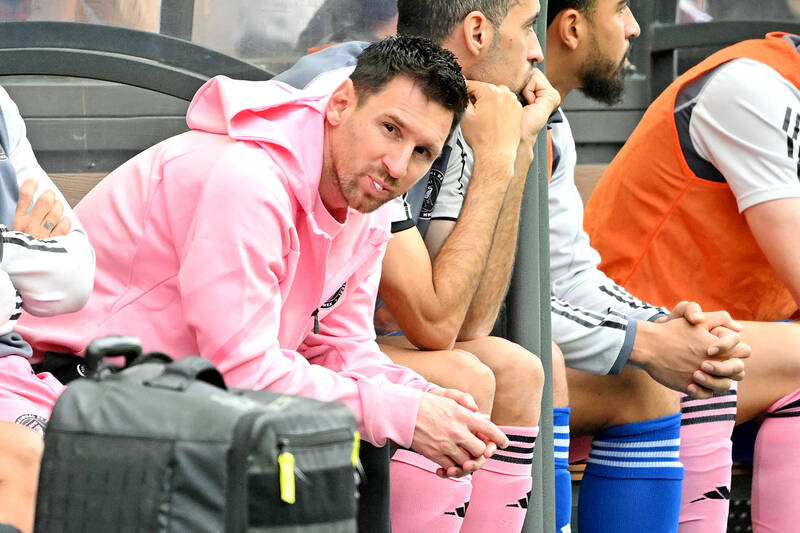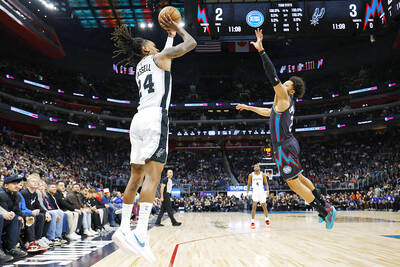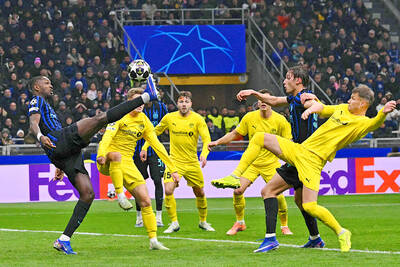Lionel Messi denied his absence from a match in Hong Kong two weeks ago that angered China was a political snub, but was caused by an injury.
The eight-time Ballon d’Or winner is idolized by fans in China, but stayed on the bench during Inter Miami’s 4-1 win in a pre-season tour match against a Hong Kong select XI on Feb. 4.
A near 40,000 sellout crowd, who had paid upwards of HK$1,000 (US$128) to see the 36-year-old superstar in action, chanted “refund,” gave thumbs-down signs and booed Messi and the team’s co-owner David Beckham after the final whistle.

Photo: AFP
Some nationalist politicians interpreted Messi’s absence as a snub to China after the Argentina great was fit enough to take the field for 30 minutes in a friendly a few days later in Japan.
In a video posted on China’s Sina Weibo social media platform late on Monday, the World Cup-winning captain rejected claims that his no-show was “for political reasons.”
If that had been the case, he “would not have traveled” to Hong Kong in the first place, he said.
“As everyone knows, I always want to play and be in every game,” he said.
“Since the start of my career, I’ve had a very close and special relationship with China,” he said in the 140-second video. “I’ve done lots of things in China — interviews, games and events. I’ve also been there and played many times.”
His reason for not playing was due to injury, he said, specifically “inflammation of an adductor” muscle.
“As always, I send good wishes to everyone in China, who I’ve always had, and continue to have, special affection for. I hope to see you again soon,” he said.
Fans on Sina Weibo reacted quickly to the video, some in support of Messi.
“I believe the player I have always loved would never look at his fans with any kind of prejudice,” wrote one user, adding that “he always values every fan.”
“I still can’t understand how such a supreme footballer, the greatest of all time, can be pilloried online to the extent that he is considered not to love China just for missing a friendly match,” another fan wrote.
Not everyone was appeased.
“Turns out it’s still hard to say sorry after all,” read one comment.
“Give it a rest,” another said. “Run off to Japan and drink sewage.”
This is at least the third time Messi has explained why he did not play in the exhibition match, after a news conference in Tokyo and a written statement published on Sina Weibo.
The state-run Global Times earlier this month said in an editorial that Messi failed to apologize and the effect of the incident “far exceeded the realm of sports.”
Chinese sporting authorities canceled planned friendly games between Argentina and Nigeria as well as Ivory Coast in the wake of the saga.
Hong Kong politicians also weighed in, with Legislative Council member Regina Ip saying that Messi should be banned from the territory because of his “lies and hypocrisy.”
The organizer of the Hong Kong match said it would issue a 50 percent refund to ticket holders worth US$7.2 million because of Messi’s no-show.
There are signs that Messi’s latest statement might calm the waters.
Former Global Times editor-in-chief Hu Xijin, who earlier led criticism of the soccer legend, wrote on X that Messi’s “attitude seemed sincere” in the video and he personally accepts the explanation.
Nevertheless, Messi would pay a price in terms of a damaged image in China, Hu said.
Additional reporting by Bloomberg

The Cleveland Cavaliers on Tuesday emphatically got back to winning ways in the NBA, coasting to a 109-94 victory over the New York Knicks as their recent star signing, James Harden, scored 20 points. The Cavs took the lead barely a minute into the game with an Evan Mobley three-pointer and never gave it up in a thoroughly comfortable night for the red-hot Ohio franchise. Former NBA Most Valuable Player (MVP) Harden, who was brought in from the Los Angeles Clippers this month, has never won a championship, despite being one of the most decorated players in the league. That was a key

LATE RALLY FAiLS: Jalen Duren led a late Detroit Pistons fightback, but it ultimately fizzled as a resolute San Antonio Spurs saw out the game Victor Wembanyama on Monday led a defensive masterclass as the San Antonio Spurs outmuscled the Detroit Pistons 114-103 in an intense and aggressive clash between the NBA’s two most in-form teams. Sitting second in the Western Conference, the Spurs were pushed hard for their ninth straight victory by the East-topping Pistons, who had entered the home court matchup on a five-game winning streak of their own. Defenses dominated the first meeting between the two sides this season, with Wembanyama making six blocks and 17 rebounds to fuel transitions as the Spurs pulled clear in the latter stages. While the Pistons’ shooting was at

HAT-TRICK: In the other games, Newcastle United and Leverkusen also advanced, as did Atletico Madrid, with Alexander Sorloth scoring three goals What a difference a year makes. Or nine months to be precise. Last season, Inter reached the UEFA Champions League final in style, with thrilling victories over Bayern Munich and Barcelona, but on Tuesday, the Italian giants limped out of the competition with a disappointing 2-1 loss at home to Bodo/Glimt — knocked out in the playoff round 5-2 on aggregate — in what is being labeled as one of the biggest upsets in Champions League history. It was not the first major upset the tiny Norwegian team have pulled off this season after wins over Manchester City and Atletico Madrid, and

Jonathon Long, an infielder in the Chicago Cubs organization, is to be unable to join Team Taiwan at the upcoming World Baseball Classic (WBC) due to an elbow injury, the CPBL said in a news release today. The CPBL, which coordinates the national team, said it was notified by the Cubs franchise that Long is still hampered by a strained left elbow. The injury has forced the 24-year-old to withdraw from the roster, it said. "Long was very eager to suit up for the national team, and his determination deeply moved us," the CPBL said. "We wish him a fast recovery and